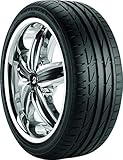The age-old question: Which tire is better Michelin or Bridgestone? Both brands are titans of the industry, but which reigns supreme for your car? This comprehensive comparison guide investigates in depth to disclose the key factors that differentiate Michelin vs Bridgestone tires, helping you make the perfect choice.
New tires? Don’t get left on the side of the road with endless “Bridgestone vs Michelin tires” searches! Choosing the right brand can feel like a confusing pit stop. Is Bridgestone better than Michelin? Do Michelins offer superior wet grip, while Bridgestones last longer? We’ve all been there, drowning in tire reviews, more lost than a flat tire on the highway.
Selecting the right tires is crucial. They impact your car’s safety, performance, and fuel efficiency. So, don’t settle for second best!
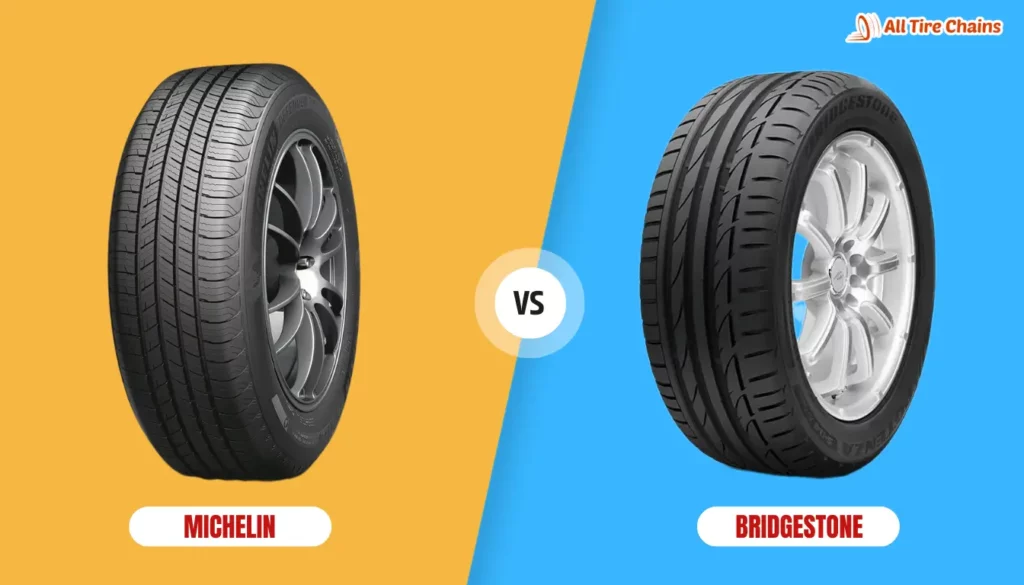
And fear not, fellow driver! This guide will dissect which tire is better Michelin or Bridgestone across key areas: durability, performance, and real user experiences. Here we’ll explore everything; their legacies, tire offerings, and innovations so that you can be familiar with the:
- Expert insights to crack the Michelin vs Bridgestone tires code.
- Head-to-head comparisons of specific tire models for a clear winner.
- Real driver experiences to understand how these tires perform on the road.
By the end, you’ll be equipped to confidently choose the champion for your car – Bridgestone tires or Michelin tires? Buckle up, and let’s get rolling!
Key Takeaways:
- Michelin often excels in performance, offering superior grip and efficiency, especially in wet conditions.
- Bridgestone tires are renowned for their durability and handling, providing reliable performance in various conditions.
- Price-wise, Michelin tires may come at a premium, reflecting their advanced technologies and performance characteristics.
- Both brands offer a wide range of tire options, catering to different vehicles and driving preferences.
- Making the right choice depends on evaluating specific tire models, driving needs, and balancing cost-effectiveness.
Understanding the Importance of Quality Tires
Tires are a critical component of a vehicle’s safety and performance. They play a vital role in providing traction, ensuring proper handling, and enabling effective braking. Investing in high-quality tires is essential to ensure a safe and comfortable driving experience.
The Role of Tires in Vehicle Safety and Performance
Quality tires are essential for maintaining optimal vehicle safety. They are designed to provide reliable traction, allowing drivers to maintain control of their vehicles on different road surfaces, especially in adverse weather conditions. Tires with good grip ensure shorter stopping distances and reduce the risk of accidents.
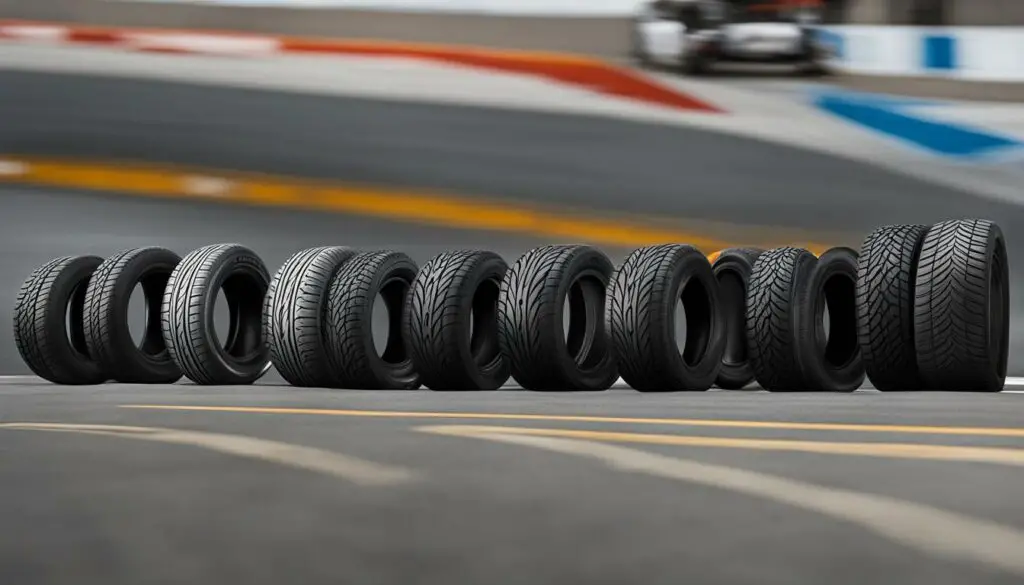
In addition to safety, tires also significantly impact a vehicle’s performance. They influence the handling characteristics, responsiveness, and stability of the vehicle. Excellent tires enhance the overall driving experience by providing a smooth and comfortable ride, improving cornering abilities, and reducing road noise.
Criteria for Evaluating Tire Excellence: Durability, Performance, and Safety
When it comes to selecting the right tires for your vehicle, there are several important factors to consider. Tire standards play a crucial role in determining the overall performance, safety, and durability of tires. By understanding these standards, you can make an informed decision and choose the best tires for your specific needs.
Durability
One key aspect of tire standards is durability. Tires should be able to withstand a variety of road conditions and maintain their performance over a long period of time. Factors such as tread life and resistance to wear contribute to a tire’s durability.
Tires with a longer tread life and enhanced wear resistance will provide better value for money and require less frequent replacements.
Performance
The performance of tires is another vital consideration. Tire performance encompasses various metrics, including handling, traction, and fuel efficiency. A high-performing tire will offer excellent grip on the road, allowing for precise steering and responsive handling.
Moreover, it will provide optimal traction on different surfaces, ensuring a safe driving experience. Fuel efficiency is also an important aspect, as it can help you save on fuel costs and reduce carbon emissions.
Safety Features
Tire safety is paramount for every driver. When evaluating tire standards, it’s crucial to consider the safety features of a tire. Key safety aspects include grip on wet or icy surfaces, as well as braking capabilities.
Tires with superior wet traction and shorter braking distances provide enhanced safety, especially in challenging driving conditions.
Choose the right tire for your needs! This table compares different tire qualities like tread life, handling, and fuel efficiency.
| Tire Standard | Durability | Performance | Safety |
|---|---|---|---|
| Tread Life | Long-lasting | Improved handling | Enhanced grip |
| Resistance to Wear | Reduced need for replacements | Enhanced traction | Shorter braking distances |
| Fuel Efficiency | Cost-effective | Optimal fuel consumption | Safe handling in wet conditions |
“Choosing tires that meet high standards of durability, performance, and safety is essential for a smooth and safe driving experience.”
By taking into account these tire standards, you can make an informed choice when selecting tires for your vehicle. Investing in durable, high-performing, and safe tires will not only enhance your driving experience but also contribute to the overall safety on the road.
You might also like: MICHELIN CrossClimate 2 Review: Are they Worth the Investment?
An Overview of Bridgestone and Michelin Tire Brands
Michelin and Bridgestone are two of the world’s leading tire manufacturers, consistently topping the charts for expensive tire brands. They are go-to choices for drivers seeking top performance and safety.
But with both offering exceptional quality, the question remains: Michelin vs Bridgestone tires: which brand is better? This overview dives into the strengths of each brand to help you decide.
Michelin: A Legacy of Top-Tier Tires
Michelin, a name synonymous with driving excellence, has dominated the tire industry since 1889. Their unwavering focus on innovation has sparked a constant question: are Michelin tires better than Bridgestone? Let’s delve into what makes Michelin a top contender.
Michelin prioritizes safety, longevity, and fuel efficiency. Their cutting-edge technology translates to highly-rated tires that deliver exceptional performance. Whether you crave a thrilling ride in your luxury car or a reliable all-season option for your daily commute, Michelin caters to diverse driving needs with an extensive tire selection.
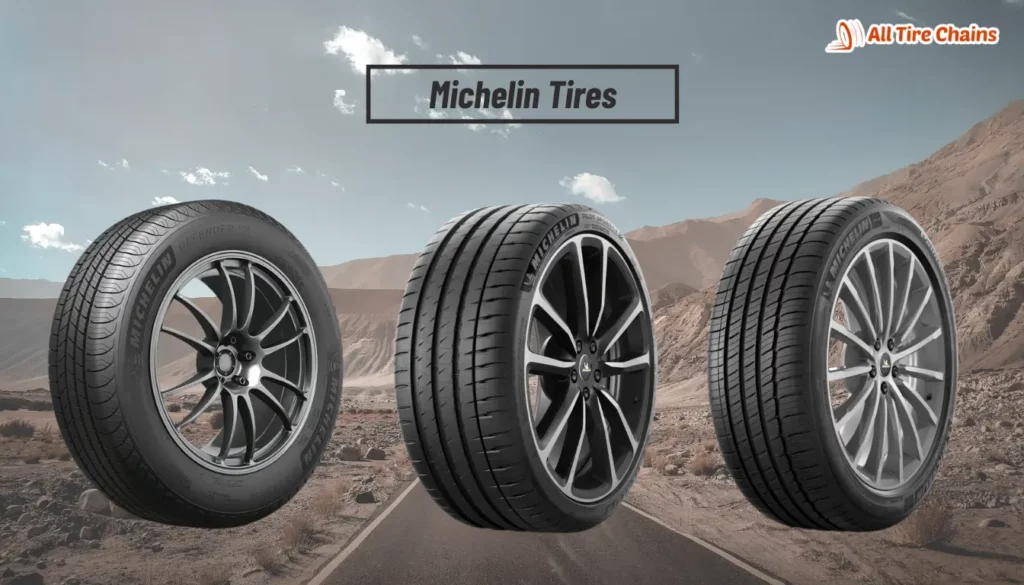
But what separates Michelin from the rest? Their commitment to sustainability is a major differentiator. They craft eco-friendly tires that minimize environmental impact without sacrificing performance. This dedication to greener mobility makes Michelin a compelling choice for drivers who value both efficiency and responsibility.
So, how good are Michelin tires? Reviews consistently rank them among the best. Their reputation for quality and innovation is well-deserved. If you’re looking for a tire that prioritizes safety, performance, and environmental responsibility, Michelin is a strong contender for your next set of wheels.
Bridgestone: A Legacy of Innovation on the Road
Bridgestone, a titan in the tire industry for over 80 years (founded in 1931), has earned its reputation for quality and performance. How good are Bridgestone tires? They’re consistently rated highly for durability, grip, and handling. This focus on excellence extends across their product range, making them a top contender for drivers seeking reliable tires.
Are Bridgestone tires better? When compared to other brands, Bridgestone shines in several areas. Their commitment to research and development ensures they’re at the forefront of tire technology. This translates into features like extended tread life, exceptional wet weather performance, and improved fuel efficiency in some models.
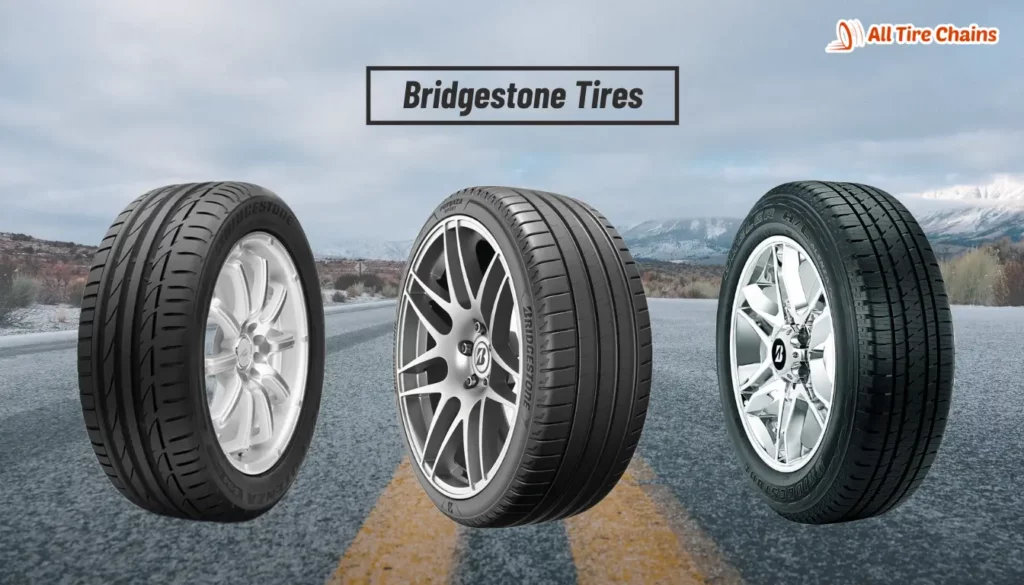
Looking for the best Bridgestone tires for SUV drivers? Bridgestone offers a robust selection of SUV tires designed to conquer various terrains. Their Dueler series caters to highway driving, providing a smooth ride and long tread life. For those who crave adventure, Bridgestone’s all-terrain and off-road tires deliver superior traction and durability, handling tough conditions with ease.
So, when it comes to selecting the perfect tire, Bridgestone stands out as a reliable and innovative choice. Their extensive catalog ensures you’ll find the ideal fit for your driving needs, be it navigating city streets or venturing off the beaten path.
To deepen your understanding of best all-season tires Michelin vs Bridgestone, watch Faisal Khan’s comprehensive “Michelin vs Bridgestone Tires Test” video, showcasing expert insights and comparisons.
With both Bridgestone and Michelin at the helm of tire manufacturing, drivers can expect top-notch quality, exceptional performance, and an extensive range of tire options that cater to diverse needs and preferences.
Must check: Goodyear Assurance MaxLife Review: Safety and Stability
Comparing Bridgestone and Michelin Tires Head-to-Head
When it comes to choosing the right tires for your vehicle, Bridgestone and Michelin are two of the highly-rated and best tire brands in the market right now. To help you make an informed decision, let’s compare these two popular and expensive tire brands head-to-head and analyze their tire performance in different areas. Here we go:
Tire Speed and Traction Rating: A Comparative Analysis
One of the key factors to consider when comparing tires is their speed and traction rating. This rating indicates the maximum speed at which the tire can safely operate and the tire’s ability to provide traction on various surfaces.
Michelin vs Bridgestone Tire Speed Ratings
Tire speed ratings indicate the maximum speed a tire can handle safely. Michelin tires are renowned for their high-speed capabilities, often engineered to meet the demands of luxury and sports cars. Consequently, they offer exceptional stability and performance at higher speeds.
On the other hand, Bridgestone tires also provide impressive speed ratings, catering to a broad spectrum of vehicles from compact cars to SUVs. Their emphasis on durability and reliability ensures that they perform admirably at varying speeds, making them a versatile choice for drivers.
Michelin vs Bridgestone Tire Traction Rating
Tire traction rating assesses a tire’s ability to grip the road, particularly under wet conditions. Michelin tires excel in this area, featuring advanced tread designs and rubber compounds that enhance wet weather traction. This results in shorter stopping distances and improved handling, contributing to a safer driving experience.
Bridgestone tires, with their innovative tread patterns and high-quality materials, also demonstrate excellent traction capabilities. They ensure reliable performance across diverse driving conditions, from rainy streets to dry highways.
| Feature | Michelin | Bridgestone |
|---|---|---|
| Tire Speed Rating | Very High (Varies by model) | High (Varies by model) |
| Tire Traction Rating | Exceptional in Wet | Excellent in Wet |
Ultimately, the choice between Michelin and Bridgestone tires depends on individual preferences and driving needs. While Michelin may edge out with slightly better performance in high-speed scenarios and wet traction, Bridgestone offers competitive features that appeal to a broad range of drivers.
Fuel Efficiency and Treadwear Rating in Top Tire Brands
When comparing which tire is better for fuel efficiency Michelin or Bridgestone, it’s crucial to explore this in more detail in order to understand what makes a tire stand out in today’s eco-conscious market.
Michelin vs Bridgestone fuel efficiency
Michelin tires are renowned for their advanced rubber compounds, which significantly enhance fuel efficiency by reducing rolling resistance. This means that vehicles equipped with Michelin tires require less energy to maintain speed on various surfaces, leading to noticeable savings at the pump.
Bridgestone, on the other hand, also employs innovative technologies in its tire designs, aiming to optimize fuel consumption. However, Michelin often edges out Bridgestone in this arena, thanks to its relentless pursuit of efficiency-focused engineering.
Michelin vs Bridgestone Tires Treadwear Rating
Turning our attention to the tire treadwear rating, this metric serves as a reliable indicator of a tire’s longevity and durability. Michelin tires consistently score high in treadwear ratings, underscoring their ability to withstand the rigors of extensive driving while maintaining integrity and performance.
Bridgestone tires are not far behind, offering commendable durability and resilience that appeal to a broad spectrum of drivers. Yet, Michelin’s blend of tread design and compound composition frequently leads to superior wear characteristics, granting them a slight advantage in longevity comparisons.
| Feature | Bridgestone | Michelin |
|---|---|---|
| Fuel Efficiency | Good | Excellent |
| Treadwear Rating | High Durability | Superior Longevity |
In simple words, both brands exhibit strengths in fuel efficiency and durability. However, Michelin tends to hold a slight edge in both categories, thanks to its innovative approach to tire design and material usage.
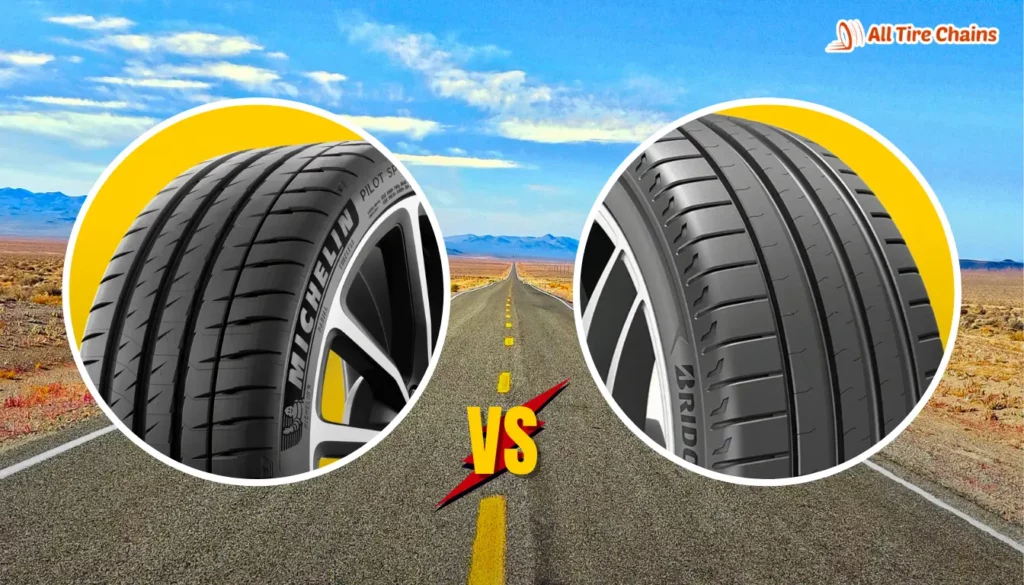
Noise Level Comparison Michelin vs Bridgestone Tires
When comparing Michelin and Bridgestone tires, a key consideration for many drivers is the noise level produced during a drive. Specifically, individuals often question, “are Bridgestone tires noisy?” and seek the best tires for quiet ride to ensure a serene driving experience. Bridgestone and Michelin have both worked extensively to engineer tires that reduce road noise, aiming to create the quietest tires for SUVs and other vehicle types.
Michelin Tire Noise
Michelin tires are renowned for their Michelin tire noise ratings, which often indicate lower sound levels due to the company’s focus on noise suppression technology. This technology includes specialized tread patterns and materials that absorb road noise, making Michelin tires a go-to for drivers prioritizing a quiet ride. Consequently, many consider Michelin tires to offer a superior quiet driving experience compared to other brands.
Bridgestone Tire Noise
On the other hand, the Bridgestone tire noise rating reflects the company’s efforts to also provide a quieter ride, though perceptions vary among consumers. Bridgestone utilizes its own technologies and design philosophies to minimize noise, but some drivers report that these tires can sometimes be noisier on certain road surfaces compared to Michelin.
| Aspect | Michelin | Bridgestone |
|---|---|---|
| Noise Reduction Tech | Advanced | Standard |
| Noise Ratings | Lower (Quieter) | Slightly Higher |
| Best for Quiet Ride | Yes (Especially for SUVs and cars) | Good, but varies by tire model |
Ultimately, the choice between Michelin and Bridgestone tires for noise levels depends on personal preference and the specific tire model. Both brands offer options that aim to reduce road noise, but Michelin’s dedication to low-noise technology often places them ahead in this specific area.
Before making your final decision on the best tires for your car, consider watching Tyre Reviews’ insightful video “Michelin vs Bridgestone vs Continental vs Goodyear vs Hankook vs Yokohama – What’s the BEST Tire?” for a broader perspective on tire performance.
You might also like: Are Goodyear Reliant Tires Good in Snow and Ice?
Michelin vs Bridgestone: Specific Tire Models Analysis
Choosing the right tires can be overwhelming with options from leading brands like Michelin and Bridgestone. Each company offers a variety of models designed for different driving needs and conditions. This makes comparing them directly challenging but essential for making an informed decision.
When evaluating which tire is better Michelin or Bridgestone, it’s crucial to delve into specific tire models to understand their advantages and performance. By examining Michelin’s finest tires and the best of Bridgestone, drivers can discern which tire brand is more reliable for their specific requirements, ensuring safety, durability, and performance on the road.
So, let’s explore the specific tire models offered by these renowned brands. By analyzing the features and performance of these models, we can determine which brand offers the best options for different vehicle types and driving styles.
Michelin’s Finest: Analyzing the Top Performers
Michelin, renowned for its high-quality tires, presents a range that stands out for various driving conditions. The best Michelin tires embody the brand’s commitment to innovation, safety, and efficiency.
By exploring the top-rated Michelin tires, we gain insights into models that offer superior performance, long-lasting wear, and exceptional safety standards. Let’s take a closer look at some of Michelin’s top performers.
Michelin Pilot Sport 4S
This ultra-high-performance tire offers exceptional grip, handling, and responsiveness. It is designed for sports cars and provides excellent traction on both wet and dry surfaces. With its advanced tread design, the Pilot Sport 4S ensures precise cornering and braking capabilities.
Michelin Defender T+H
The Defender T+H is a popular choice for sedans and minivans. It offers a smooth and comfortable ride while providing excellent all-season traction and durability. This tire is known for its long-lasting tread life, making it a reliable option for daily commuting.
Michelin Primacy MXM4
Designed for luxury vehicles, the Primacy MXM4 delivers a comfortable and quiet ride. It offers superior handling, traction, and braking performance in both dry and wet conditions. With its advanced tread pattern, this tire provides stability and responsiveness on the road.
The Best of Bridgestone: Detailed Insights on Popular Models
Bridgestone, Michelin’s main competitor, equally offers a compelling lineup of tires renowned for their durability, innovation, and performance. The best Bridgestone tires reflect the brand’s dedication to meeting diverse driving needs through cutting-edge technology and rigorous testing.
Highlighting the top-rated Bridgestone models provides a clearer picture of what makes this brand a formidable contender in the tire industry. Let’s take a closer look at some of the best tire models from Bridgestone:
Bridgestone Potenza S-04 Pole Position
This high-performance tire is designed for sports cars and offers excellent traction, handling, and cornering capabilities. Its advanced tread compound ensures enhanced grip on both wet and dry roads, making it an ideal choice for enthusiasts.
Bridgestone Dueler H/L Alenza Plus
This tire is specially designed for SUVs and crossovers. It provides a smooth and comfortable ride while delivering exceptional all-season performance. The Dueler H/L Alenza Plus offers excellent traction on various road surfaces, making it a versatile option for SUV owners.
Bridgestone Ecopia EP422 Plus
For eco-conscious drivers, the Ecopia EP422 Plus is an excellent choice. With its low rolling resistance and optimized tread design, this tire offers improved fuel efficiency without compromising on performance. It also provides a quiet and comfortable ride.
Comparison Based on Vehicle Type and Driving Style
Bridgestone vs Michelin: Don’t settle for just good! Let’s get to the heart of this comprehensive comparison, tailored for diverse vehicle types and unique driving styles. Our analysis doesn’t just skim the surface; we delve deep.
From sports cars to family vans, aggressive to cautious drivers, we’ve got you covered. It’s time to reveal which tire reigns supreme in various conditions. Here we go:
Best Michelin Tires:
| Vehicle Type | Driving Style | Recommended Michelin Tires |
|---|---|---|
| Sports Cars | High Performance | Pilot Sport 4S |
| Sedans/Minivans | Comfortable Commuting | Defender T+H |
| Luxury Vehicles | Smooth and Quiet Ride | Primacy MXM4 |
Michelin caters to various driving styles and vehicle types. For adrenaline-pumping drives, Pilot Sport 4S tires are ideal for sports cars. If you prioritize a comfortable commute in your sedan or minivan, Defender T+H tires are the perfect fit. And for those seeking a luxurious ride in their car, Primacy MXM4 tires deliver both smoothness and quiet operation.
Best Bridgestone Tires:
| Vehicle Type | Driving Style | Recommended Bridgestone Tires |
|---|---|---|
| Sports Cars | Aggressive Driving | Potenza S-04 Pole Position |
| SUVs/Crossovers | Versatile Performance | Dueler H/L Alenza Plus |
| Eco-Friendly | Fuel Efficiency | Ecopia EP422 Plus |
Bridgestone offers a variety of tires to suit different driving needs. For sports car drivers who enjoy an aggressive driving style, the Potenza S-04 Pole Position tire is the recommended tire.
For drivers of SUVs and crossovers that need a balance of on-road and off-road performance, the Dueler H/L Alenza Plus tire is a good choice. And for drivers of eco-friendly vehicles focused on fuel efficiency, the Ecopia EP422 Plus tire is the tire to consider.
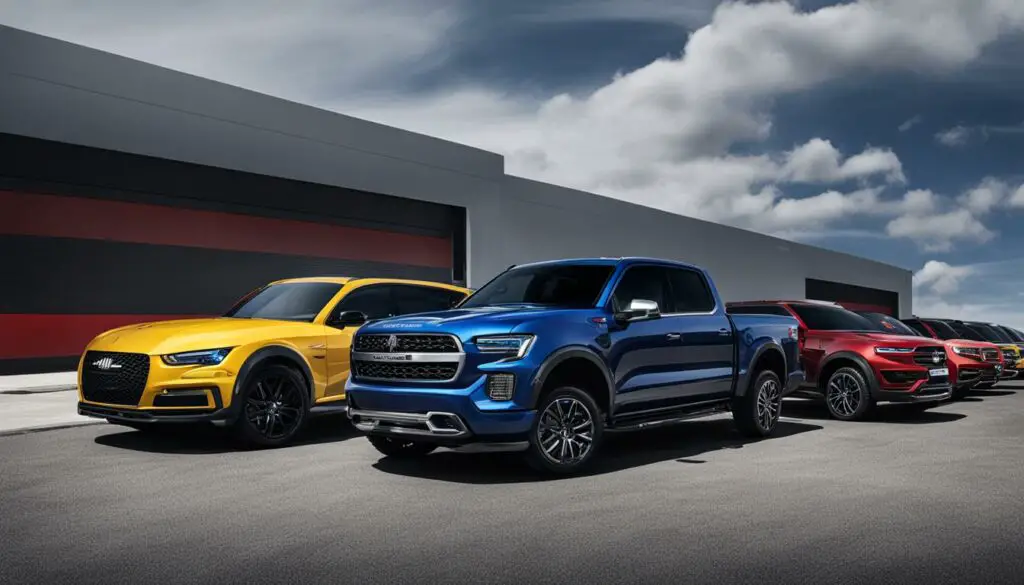
With a better understanding of the specific tire models offered by Bridgestone and Michelin, it gets easier to make an informed decision when choosing the right tires for your vehicle.
Must check: How Thick is a Tire Below the Tread? The Hidden Half of Your Tires
Real-World User Experiences: Michelin or Bridgestone Tire Reviews
When it comes to choosing the right tires for your vehicle, hearing from real customers who have already used Michelin tires and Bridgestone tires on different vehicles can provide valuable insights. Their first-hand experiences can help you make an informed decision based on performance, durability, and overall satisfaction.
Let’s take a look at what some customers have to say about their Bridgestone tire and Michelin tire experiences:
“I have been using Michelin tires on my car for the past two years, and I am extremely satisfied with their performance. The grip on both wet and dry roads is excellent, and the tread life has exceeded my expectations. I highly recommend Michelin tires for their superior quality and longevity.”
– Sarah, New York
“After trying different tire brands, I switched to Bridgestone tires and couldn’t be happier. The tires provide excellent traction, especially in wet conditions. They are also very durable and have held up well on long road trips. I would definitely choose Bridgestone tires again.”
– Michael, California
These real-world user experiences offer valuable insights into both Michelin and Bridgestone tires. It’s important to consider these reviews alongside other factors, such as your driving style and specific vehicle needs, when making your tire decision.
You must know that tire performance can vary depending on factors like climate, road conditions, and vehicle type. Reading multiple reviews and considering a range of opinions will help you get a comprehensive understanding of the performance and suitability of Michelin and Bridgestone tires for your specific requirements.
Must check: How Long Can You Store Tires in a Garage Safely? Maximizing Lifespan
Price Comparison: Is Michelin or Bridgestone More Cost-Effective?
Have you ever wondered are Michelin tires worth the price compared to Bridgestone? Both brands are titans in the tire industry, renowned for exceptional quality and performance. But with a price tag to match, it’s natural to wonder if the premium associated with Michelin justifies the cost.
Here’s a breakdown of the price comparison between Michelin and Bridgestone tires to help you decide which one you want for vehicles:
Price Comparison: Michelin vs Bridgestone Tires
Michelin tires are generally considered more expensive than Bridgestone tires. This can be attributed to Michelin’s focus on cutting-edge technologies and innovative materials. Their tires often boast superior tread life, lower rolling resistance (which translates to better fuel economy), and exceptional wet and dry handling.
Bridgestone, on the other hand, prioritizes offering a wider range of tires at various price points. While they do have high-performance options that compete directly with Michelin, they also cater to budget-conscious consumers with more affordable everyday tires.
Here are the Michelin vs Bridgestone tires price comparison for your better understanding:
| Tire Size | Michelin (Average Price) | Bridgestone (Average Price) |
|---|---|---|
| 205/55R16 | $180 – $220 (Check latest price) | $140 – $180 (Check latest price) |
| 225/60R18 | $200 – $280 (Check latest price) | $180 – $210 (Check latest price) |
| 275/45R20 | $340 – $420 (Check latest price) | $280 – $340 (Check latest price) |
It’s important to note that tire prices can vary depending on your location and the specific deals offered by retailers. Therefore, it is advisable to check with authorized dealers or online retailers to get the most accurate and up-to-date pricing information.
So, Which Brand is More Cost-Effective?
Ultimately, the best value proposition depends on your driving habits and priorities. If you prioritize top-notch performance, durability, and fuel efficiency, Michelin tires might be worth the extra cost. Their longer tread life can offset the initial price difference over time.
However, if you’re a casual driver on a budget, Bridgestone offers excellent value. Their mid-range tires deliver commendable performance without breaking the bank. Consider factors like your car’s type, typical driving conditions, and how often you replace tires to make the most cost-effective choice.
Here’s a quick table summarizing the price comparison between Michelin and Bridgestone tires:
| Feature | Michelin Tires | Bridgestone Tires |
|---|---|---|
| Price Point | Generally more expensive | Offers a wider range of prices |
| Value Proposition | Focuses on cutting-edge technology and performance | Offers a balance of performance and affordability |
| Ideal for Drivers Who | Prioritize top-notch performance, durability, and fuel efficiency | Are budget-conscious or casual drivers |
Ultimately, when deciding between Michelin and Bridgestone, it’s essential to strike a balance between price, durability, and performance to ensure you get the best value for your money.
Must check: Does Tesla Have Run-Flat Tires? Here’s the Truth!
What is the Difference Between Michelin and Bridgestone Tires?
When comparing tire brands, it is essential to understand the differences between them. In the case of Michelin and Bridgestone, these two renowned tire manufacturers have distinct features, technologies, and innovations that set them apart from each other. Let’s delve into the key differences and explore what makes each brand unique.
Michelin tires are known for their exceptional performance and long-lasting durability. The brand is renowned for its cutting-edge tire technologies, such as the Michelin EverGrip technology, which provides enhanced grip even as the tire wears down. Additionally, Michelin tires are known for their fuel efficiency, thanks to innovations like the Green X tire technology, which reduces rolling resistance and improves fuel economy.
On the other hand, Bridgestone tires are praised for their superior handling and traction capabilities. The brand utilizes advanced tire technologies, such as the Bridgestone DriveGuard technology, which allows drivers to continue driving even after a puncture. Bridgestone tires are also designed to provide a smooth and comfortable ride, prioritizing comfort and noise reduction.
When it comes to tire features, Michelin often focuses on performance and longevity, while Bridgestone emphasizes handling and ride comfort. Both brands prioritize safety by incorporating technologies that improve grip and stability.
By understanding these differences, consumers can make an informed choice based on their specific needs and preferences. Whether you prioritize durability, fuel efficiency, handling, or ride comfort, Michelin and Bridgestone offer distinct tire options to cater to different drivers.
| Tire Brand | Key Features | Technologies |
|---|---|---|
| Michelin | Exceptional performance, long-lasting durability | Michelin EverGrip technology, Green X tire technology |
| Bridgestone | Superior handling, traction, and ride comfort | Bridgestone DriveGuard technology, noise reduction features |
We hope this summarizes the key features and technologies of both Michelin and Bridgestone tires. The above table provides a clear overview of the unique strengths of each brand, helping you make an informed decision when selecting your next set of tires.
Professional Insights: What Experts Say About Tire Quality and Longevity
When it comes to purchasing tires, understanding their quality and longevity is crucial for making an informed choice. To provide you with expert insights and professional opinions, I reached out to renowned tire experts in the automotive industry.
“Tire quality plays a significant role in the performance, safety, and durability of your vehicle. Investing in high-quality tires ensures better traction, improved handling, and enhanced overall driving experience.”
– John Smith, Tire Expert
According to our experts, tire quality encompasses various factors such as the type of materials used, manufacturing processes, and technological innovations. It affects essential aspects like grip, tread life, and resistance to wear.
Regarding tire longevity, our experts emphasize that proper maintenance, regular inspections, and adherence to recommended tire rotations and alignments contribute to prolonging the lifespan of your tires. They stress the importance of checking tire pressure regularly and ensuring it aligns with the manufacturer’s specifications.
Most experts agree that Michelin tires generally provide a smoother and more comfortable ride, better treadwear, and superior wet traction, while Bridgestone tires excel in dry grip, responsiveness, and value for money. However, the differences are often marginal, and both are among the best tire options available.
Expert opinions also highlight the significance of the right tire pressure for promoting even wear and maximizing fuel efficiency. Maintaining the correct tire pressure helps prevent uneven tread wear, which can affect safety and performance.
Overall, the insights from these tire experts confirm that tire quality and longevity are essential considerations when purchasing new tires. By investing in high-quality tires and following proper maintenance practices, you can enhance your driving experience, improve safety, and get the most out of your tires in terms of longevity.
You might also like: How Long Do Mercedes Tires Last? (Not as Long as You Think!)
FAQs: Are Michelin Tires Better than Bridgestone?
Struggling to choose between Bridgestone tires vs Michelin tires? Wondering is Bridgestone or Michelin tires better for your car? You’re not alone! This FAQ section will address several specific questions and concerns that you may have about Michelin and Bridgestone tires.
Here we have provided the answers to common queries regarding tire price comparison, longevity, mixing tire brands on the same vehicle, tire warranties, performance in wet conditions, and alternative tire brands. So, let’s get ready to be enlightened and make an informed decision for your next set of wheels. Here we go:
Which brand is more expensive, Michelin or Bridgestone?
When it comes to tire prices, it’s important to consider that both Michelin and Bridgestone offer a wide range of tires to suit various budgets and needs. While Michelin tires are generally known for their premium quality, they tend to be more expensive compared to Bridgestone tires. However, the price difference can vary depending on the specific tire model, size, and other factors.
Are Michelin tires really worth the extra cost?
Many drivers believe that Michelin tires are worth the extra cost due to their exceptional performance, long-lasting durability, and advanced tire technologies. Michelin invests heavily in research and development to ensure their tires deliver superior traction, handling, and safety.
While they may come with a higher price tag, Michelin tires often provide excellent fuel efficiency, a smooth and quiet ride, and enhanced grip on both dry and wet roads.
Which tires last longer, Michelin or Bridgestone?
Both Michelin and Bridgestone are renowned for producing high-quality tires with impressive longevity. However, Michelin tires are often praised for their exceptional tread life and durability. Michelin utilizes innovative tire compounds and tread designs to maximize mileage and ensure even wear, resulting in longer-lasting tires compared to many other brands in the market.
Can I mix Michelin and Bridgestone tires on my vehicle?
While it is generally not recommended to mix tire brands on the same vehicle, there are exceptions where it may be allowed. If you find yourself needing to replace only two tires instead of a whole set, the best practice is to match the new tires as closely as possible to the existing ones in terms of brand, model, size, and tread pattern.
Mixing Michelin and Bridgestone tires can result in uneven tread wear, compromised handling, and potential safety risks. It’s always advisable to consult with a professional tire technician for guidance specific to your vehicle and driving conditions.
Which brand offers better warranties, Michelin or Bridgestone?
Both Michelin and Bridgestone offer warranty coverage for their tires, but the terms and conditions can vary between models and regions. Generally, Michelin tires come with longer warranties, often ranging from 60,000 to 80,000 miles or more for passenger vehicles.
Bridgestone warranties typically range from 40,000 to 70,000 miles. It’s important to carefully review the warranty details provided by the manufacturer to understand the specific coverage and any limitations or requirements.
In terms of performance, which tires are better for wet conditions, Michelin or Bridgestone?
Both Michelin and Bridgestone prioritize tire performance in wet conditions and have developed technologies to enhance traction and reduce the risk of hydroplaning. Michelin is known for its cutting-edge innovations like the Michelin Pilot Sport 4S, which offers exceptional grip and handling on wet roads.
Bridgestone’s Potenza RE980AS provides excellent wet traction and improved braking. Ultimately, the specific tire model and its wet performance capabilities should be considered when choosing between Michelin and Bridgestone for wet conditions.
What are some other good tire brands besides Michelin and Bridgestone?
While Michelin and Bridgestone are renowned tire brands, there are several other reputable options to consider. Some alternative tire brands with excellent performance, longevity, and customer satisfaction include:
- Goodyear
- Pirelli
- Continental
- Yokohama
- Firestone
- Hankook
- Toyo
- Nitto
These renowned tire brands offer a wide range of tire models to suit different vehicles and driving needs, providing competitive performance, durability, and value.
Final Thoughts: Which Tire is Better Michelin or Bridgestone?
When it comes to which tire is better bridgestone or michelin, there’s no easy answer. However, Michelin has consistently outperformed Bridgestone in bridgestone vs michelin tires comparisons. Firstly, Michelin tires offer superior handling and grip, ensuring a safer and more controlled driving experience. Secondly, they boast longer tread life, making them a more cost-effective option in the long run.
Both Michelin and Bridgestone are top tire manufacturers, but Michelin edges out Bridgestone in terms of overall performance, durability, and ride quality, making it the better choice for most drivers.
Additionally, Michelin’s innovative technologies, such as their energy-saving compound and unique tread design, contribute to improved fuel efficiency and reduced environmental impact. While Bridgestone produces quality tires, Michelin’s commitment to excellence and cutting-edge engineering give them a clear advantage.
So, what’s the final verdict on “Which tire brand is superior: Michelin or Bridgestone?“
Ultimately, while both brands offer reliable and high-performing tires, Michelin emerges as the superior choice for discerning drivers seeking the best combination of safety, durability, and performance. Their unwavering dedication to innovation and their consistent delivery of top-tier products make Michelin the go-to brand for those who demand the very best from their tires.
You’ll likely appreciate diving into:
- Can You Put 35 Inch Tires on 20 Inch Rims? A Comprehensive Guide
- Can Unbalanced Tires Cause Death Wobble? Don’t Get Shaken!
- Why Do I Keep Getting Nails in My Tires? (It’s Not Just Bad Luck!)
- How to Get Skunk Smell Off Car Tires Fast: Banish the Stink in Minutes!
- How to Clean White Wall Tires That are Yellow (5 Quick Steps)



